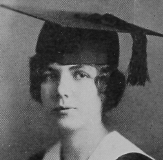Abstract
Martha Alice Ingham Dickie begins her 1985 interview discussing both her religious and academic backgrounds, elaborating on her interests in social work and international politics. These religious and intellectual values converged in 1939, when Czechoslovakia was being threatened by the Nazis and the Unitarian Churches there had been occupied. As part of the American Relief for Czechoslovakia program, Dickie and her husband traveled to Czechoslovakia to help the refugees. The majority of the interview focuses on her life in the course of World War II, during which she smuggled hundreds of refugees out of Czechoslovakia and France and into London and the United States – while raising money, organizing relief teams, and providing food and aid to refugees under Nazi occupation. Martha reflects on the emotional experiences of this time, while considering the process of bringing people to safety.
See also: An additional interview with Martha Alice Ingham Dickie, class of 1926 (interview 2 of 2), Defying the Nazis: Charlie Rose, and Guardian Angel, Brown Alumni Magazine.
Part 1
Part 2
Recorded on February 12, 1985
Interviewed by Suzanne Goldberg
Suggested Chicago style citation: Dickie, Martha Alice Ingham. Interview. By Suzanne Goldberg. Pembroke Center Oral History Project, Brown University. February 12, 1985.
Biography
Martha Alice Ingham Dickie was born in Providence on April 25, 1905. She was brought up by her aunt and uncle, the Dickies, in a very religious family that belonged to the First Baptist Church in Providence. After attending Hope Street High School, she received a scholarship to Pembroke, where she specialized in languages and fine art. Upon her graduation from Pembroke College in 1926, she attended Northwestern University in Chicago at the Hull House, studying to become a social worker. Dickie married Waitstill Hastings Sharp in 1928, and returned to Boston with her husband where she pursued her third degree at Radcliffe in comparative literature. She had two children. In 1939, Dickie and her husband left their life in Massachusetts to work for the relief effort in Czechoslovakia and France during World War II. She remained dedicated to saving refugees under Nazi occupation, successfully bringing hundreds of people to safety and providing thousands of others with food and relief in the period between 1939 and 1945.
